Steven Lyle Jordan's Blog, page 32
March 5, 2015
Specialness
 It’s hard to give up the notion that you’re not special.�� Emma Roberts, in her Metaverse post Are We Losing Our Ability to Be Human? believes our “specialness” is the thing that makes us human; that we have souls and spirituality, that we have consciousness and are aware of our place in the universe.�� And she is concerned that, as machines and artificial intelligence take over more and more of our world and our lives, we will begin to lose touch with what makes us human… and special.
It’s hard to give up the notion that you’re not special.�� Emma Roberts, in her Metaverse post Are We Losing Our Ability to Be Human? believes our “specialness” is the thing that makes us human; that we have souls and spirituality, that we have consciousness and are aware of our place in the universe.�� And she is concerned that, as machines and artificial intelligence take over more and more of our world and our lives, we will begin to lose touch with what makes us human… and special.
“…I think that without the feeling of spirituality or individualism or ���self��� we are just another biological being and that���s pretty damn soul destroying.”
I don’t think Emma should be overly concerned, and here’s why.
Speaking as one of those people who believes that our innate sense of consciousness is indeed, as Emma’s puts it, “neural trickery,” just a convenient quirk of encephalogic feedback, and nothing granted us by some mystical or spiritual realm… I admit that the idea that there is no “soul” diminishes me, as it diminishes the possibilities of the universe we exist in.�� But on the other hand, it humbles me to realize how much I have in common with every other biological organism on this planet.
At the same time, it fills me with pride, knowing how we, in essence little different than all those other biological organisms around us, and given our innate limitations, have accomplished so much and learned so much, and have the potential to learn and do so much more.�� We’ve demonstrated that we are pretty damned special, and that’s not soul-destroying at all.
 I didn’t need the realization of the growing sophistication of our science and technology to inform me of all that.�� But that growing sophistication of our science and technology is a direct reflection of exactly how amazing we are.�� We fragile beings have stood upon other planets, sent our robots to visit the edge of our Solar System, and cracked the energy in the hydrogen atom.�� Imagine someday creating an artificial being that can stand beside us and call us brother… we will have created new consciousness.�� How amazing, humbling and prideful will that be?
I didn’t need the realization of the growing sophistication of our science and technology to inform me of all that.�� But that growing sophistication of our science and technology is a direct reflection of exactly how amazing we are.�� We fragile beings have stood upon other planets, sent our robots to visit the edge of our Solar System, and cracked the energy in the hydrogen atom.�� Imagine someday creating an artificial being that can stand beside us and call us brother… we will have created new consciousness.�� How amazing, humbling and prideful will that be?
Our “specialness” is what has allowed us to perceive our world so finely, make such significant changes to it and ourselves, and stand on the brink of creating beings comparable to ourselves.�� Nothing that ever happens can take that away from us… unless we let it.�� Blaming our technology for dehumanizing us is like blaming our cars for our lack of ability to walk.�� Instead, we should be lauding our technology for allowing us to do things that mere humans could never do… like fly across country in a few hours… or talk live with people on the far side of the planet… or stand on the Moon.�� It even allows us to see into our souls (even if just to see if we actually have one).
All due respect to Emma: Our tech does not dehumanize us���it super-humanizes us.�� We are what we’ve always been… but greater.�� We shouldn’t be lamenting the loss of something we don’t even know we have; we should instead be celebrating the gain of the many things we have learned to do.

March 4, 2015
Consequences
 Occasionally people who know I’ve done some writing would ask me if I’d consider writing this kind of story, why don’t I write that kind of story, etc… you know, the ones that tend to be very epic, very popular, often made into movies, and get talked about incessantly.�� And in many cases, I’ve had a very good reason for my not wanting to write those kinds of stories.
Occasionally people who know I’ve done some writing would ask me if I’d consider writing this kind of story, why don’t I write that kind of story, etc… you know, the ones that tend to be very epic, very popular, often made into movies, and get talked about incessantly.�� And in many cases, I’ve had a very good reason for my not wanting to write those kinds of stories.
It boils down to consequences.
This Observation Deck article and discussion breaks the issue down perfectly: So many exciting sci-fi and fantasy stories tend to overlook the consequences beyond their story… consequences that aren’t so inconsequential.��

What… too soon?
Like: After an empire is defeated, how does the infrastructure of caring and feeding for everyone continue on in the hands of the small band of plucky but inexperienced rebels?�� Are all soldiers on “the other side” evil… and what about the families they leave behind as they are gleefully wiped out by the heroes?�� And in pretty much any movie that features massive action scenes in a city, surely killing hundreds, thousand, maybe more innocents… aren’t they worth more than collateral damage statistics?
I wrote Verdant Pioneers because it wasn’t enough to say that the satellite Verdant survived the events of Verdant Skies; it was a pretty major achievement, and it left them in a very unique and perilous situation, which required a new story to tell how they survived it.�� Fortunately, the story was very interesting and exciting in itself, so I felt sure someone would want to read that.�� So I wrote it.
There are consequences to every action; and when those consequences, when you stop to think about them, are pretty heinous, a little man inside my brain draws a line, and says: “I don’t wanna tell a story where we create mindless mayhem, then ignore the heinous consequences.”�� If I do create heinous consequences, I want to write about how they were fixed.
Not a lot of readers want to read that part, if you ask them.�� They don’t care about the creation of a plumber’s union to repair all the busted plumbing that the galactic rebellion caused.�� No one wants to watch the reconstruction of a city after a horrible terrorist attack.�� And no one wants to see a hero taken into court to answer to the families of the innocents caught in his crossfire.�� But if you’re a writer worth your salt, you should be able to make that a story just as compelling as the story about everything being torn down.
Most of my novels don’t need additional stories about the consequences, partially because most of my stories are fairly personal, and the consequences are self-contained.�� But there are always consequences that you might not have thought of at first, that are revealed to you later.�� And sometimes the process of dealing with those consequences demands to be written.
Most importantly: If your story has heinous consequences at the end… maybe you should be writing about dealing with those consequences.�� And maybe you should rethink your definition of a “happy ending.”

March 1, 2015
The Trouble with Nowhere
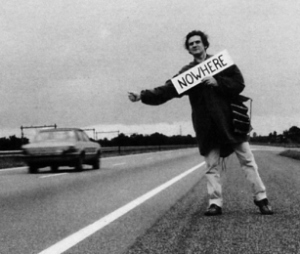 I cannot agree more with the comments made by Stowe Boyd in his online publication, Work Futures.�� The Trouble with Nowhere describes the disconnect people have with the future, and the dangers we create for ourselves by doing so.�� A number of points are made by Kevin Kelly, editor of Wired magazine, and Kenneth Boulding, the economist that first suggested the metaphor of Spaceship Earth.�� Boulding writes:
I cannot agree more with the comments made by Stowe Boyd in his online publication, Work Futures.�� The Trouble with Nowhere describes the disconnect people have with the future, and the dangers we create for ourselves by doing so.�� A number of points are made by Kevin Kelly, editor of Wired magazine, and Kenneth Boulding, the economist that first suggested the metaphor of Spaceship Earth.�� Boulding writes:
There is a great deal of historical evidence to suggest that a society which loses its identity with posterity and which loses its positive image of the future loses also its capacity to deal with present problems, and soon falls apart.
And Kelly, I think, nails it with this comment:
Today we���ve become so aware of the downsides of innovations, and so disappointed with the promises of past utopias, that we now find it hard to believe even in protopia���������that tomorrow will be better than today.
The popularity of today’s dystopian novels and movies, the lack of interest in positive futurist fiction and serious science in fiction, and the efforts put into rebooting and reusing old material instead of developing new fiction, bear witness to Kelly’s statement: We have given up on the future, spend too much time dwelling on the past, and dedicate all of our efforts to the ephemeral and transitory needs of today.
Read more in Work Futures.

February 27, 2015
Leonard Nimoy was Spock
 Leonard Nimoy, the actor who portrayed the character of Mr. Spock on Star Trek TV shows and movies for much of his acting career, died this week at 83.
Leonard Nimoy, the actor who portrayed the character of Mr. Spock on Star Trek TV shows and movies for much of his acting career, died this week at 83.
More than any other character of the franchise, Spock was iconic of Star Trek, a character recognized worldwide and cherished within the Trek community.�� No doubt volumes will be spoken about Mr. Nimoy, and the great acting talent that shaped and formed the concept of Vulcans for the generations.�� I’d just like to contribute this:
The character of Spock was much more than his emotionally-suppressed countenance: He was the voice of reason in trying and emotional times. He provided wise counsel and offered a shoulder to lean on.
And if you ever watched closely… you also discovered that Spock was clumsy as hell.�� Nimoy could barely run, apparently.�� His fighting skills were not very impressive.�� But through his talent (and clever scene setups), you probably never noticed.
And his eyebrows.�� They weren’t just mobile; given that in many scenes, Nimoy was restricted in his expressions and movements, he made those eyebrows positively manic in compensation.�� And today, it’s pretty much impossible for anyone in America to cock an eyebrow and not conjure up images of Mr. Spock to everyone around them.
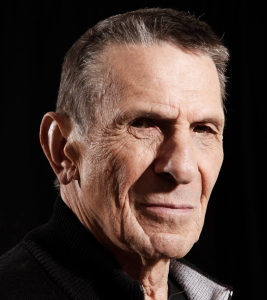 But most importantly, Mr. Spock was the outsider trying to be a part of a team, and in the process becoming a trusted and needed member of a family.�� He was emblematic of Gene Roddenberry’s vision of disparate peoples coming together, defeating prejudice and distrust of the stranger, and working together in harmony.
But most importantly, Mr. Spock was the outsider trying to be a part of a team, and in the process becoming a trusted and needed member of a family.�� He was emblematic of Gene Roddenberry’s vision of disparate peoples coming together, defeating prejudice and distrust of the stranger, and working together in harmony.
The combination of Roddenberry’s imagination and Leonard Nimoy’s talents gave us one of America’s most enduring characters, one which will live on in legend and hold its iconic status for generations.
Leonard Nimoy���and Mr. Spock���will both be missed.

February 26, 2015
Seriously, which is better?
The one that looks like it had plastic surgery to look as pretty as the real thing… and failed miserably…

#OscarSoWhat?
 A lot of press has been given lately to the claim that the American Academy Awards, or Oscars, have continued to snub black actors; #OscarsSoWhite has been the rallying hashtag this year, and pundits in and out of the industry have chimed in with responses.�� Black-white relations in the U.S. has found yet another front to start yet another of their ongoing battles against each other.
A lot of press has been given lately to the claim that the American Academy Awards, or Oscars, have continued to snub black actors; #OscarsSoWhite has been the rallying hashtag this year, and pundits in and out of the industry have chimed in with responses.�� Black-white relations in the U.S. has found yet another front to start yet another of their ongoing battles against each other.
I’m not going to regurgitate the discussions here, and here’s why:
Racism is certainly an issue in the U.S.; but calling out Hollywood for being a mostly-white cadre handing out awards to mostly-white people is, in fact, a waste of everyone’s time.
From the Facebook post:
Keep in mind three things: First, Hollywood is an old-fashioned money-making institution. Everything they do is with the express purpose of building profits. The money-makers don’t care about artists, social norms or mores, other institutions, politics or history, except to the extent that making movies on those subjects will make them money. And as long as a spreadsheet somewhere says that certain movies and certain subjects and certain actors will make them the most money… that’s the way they go, pretty much blindly. Oh, sure, they’ll occasionally allow the odd “art” film to be made, but only because it improves their cred in the industry, and allows them to make more money elsewhere.
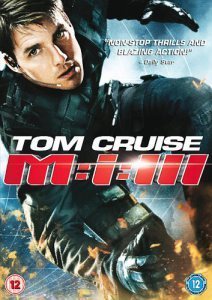
Hey, it’s not just white guys going to see his movies.
Second thing to remember is this: That money they make is from the public going to see their movies. The public, therefore, can influence Hollywood in the movies they make… and don’t make. Suppose, as an example, Hollywood makes two action-adventure movies: One stars a famous and popular white guy; and the other stars a famous and popular black guy. The movie starring the white guy makes $5 mil from an audience that is 60% white-identifiers and 40% black-identifiers. (We’ll assume other races identify with one race or the other, for this example.) The movie starring the black guy makes $2 mil from an audience that is 10% white-identifiers and 90% black-identifiers.
When, next year, Hollywood is asked to make another action-adventure movie, they will remember two things: One, that the white guy made them more money; and Two, that the black guy’s movie had significantly less diversity. They, being money-makers, will make the obvious choice when choosing their next movie and their next star. And I point out that it was the audience’s reaction to the movies that prompted their decision… they bought the tickets.�� So the public has a major influence over this situation, not just the attitudes of Hollywood moguls.
Third: The Oscars are privately-held self-back-slapping events. Why anyone outside of the industry even cares about them is beyond my ability to ken.
The public has succumbed to Hollywood’s favorite gag of allowing themselves to be distracted by the smoke-and-mirrors, and missing the fact that there’s no point in debating racial proportions in an industry that employs intentional trickery and blatant psychology to create idealized versions of reality, specifically to entice the maximum number of Americans to buy movie tickets.
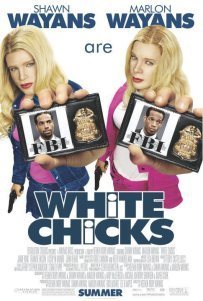
So many things wrong, in one place.
So, here’s an idea: Instead of wasting time lamenting about the incredibly unimportant issue of whether the Academy’s members pat as many black backs as white ones… why don’t we talk instead about showing our mutual distaste for the stereotypes that Hollywood continues to portray���again, for the express (and successful) purpose of getting you to buy a movie ticket���and whether that deserves some attention.
Let’s talk about the black street kid who’s poor, tough and savvy; let’s talk about the genius Asian grade-schooler; let’s talk about the Muslim who distrusts all Christians; let’s talk about the blood-sucking lawyer, the working-class girl who would give up a career for a six-packed husband, the doughnut-eating cop, the date-raping barfly and the corrupt politician.�� Those are Hollywood’s stock-in-trade, the stereotypes with which they try to represent America.�� The worlds of Superman and Mayberry and Bedford Falls, contrasted with Watts, Harlem and The Jeffersons.

Lucy Liu as Joan Watson and Jonny Lee Miller as Sherlock Holmes on Elementary
And while we’re at it, let’s also discuss how significant it is that Hollywood’s television arm can take a role originally designed for a stuffy old white man… and give it to Lucy Liu. And how phenomenal Liu is in the role of Joan Watson.�� And how actions like that should be the real meter of progress in American cinema and TV.
Not the state of an actress’ dreadlocks.
Call me an irresponsible dreamer, but… in my novels, I refuse to accept that Black America and White America will continue to stand apart, any more than I will accept any other stereotypes.�� This is why I have to pass on so many novels that seem to be set in any mono-racial or dominant-racial atmosphere���nor would I write one; even as they try to claim that they support racial equality, they are in fact an attempt to further stratify the races, a continuation of the lack of real outreach, cooperation and trust that the world needs.�� The real future of this world is The Melting Pot���and no matter how many races or nationalities we are or claim to be, we are, and will always be, One People.
Given this, maybe a more appropriate tag would be #WeArentHelping; we need to recognize that while the nation continues to obsess over race relations, it spends all of its time kvetching in the family room, while the work that needs to be done is out on the street.�� Another would be #OnePeople, to remind everyone what the desired outcome is supposed to be: Not criticism, but affirmation.

February 24, 2015
Birdman, life and extremes
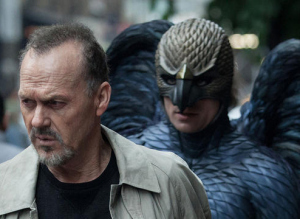 Alejandro Gonz��lez I����rritu, director of the film Birdman, recently had some interesting things to say about the movie’s main character, Riggan, played by Michael Keaton… and about all of us.
Alejandro Gonz��lez I����rritu, director of the film Birdman, recently had some interesting things to say about the movie’s main character, Riggan, played by Michael Keaton… and about all of us.
“He thinks that he is a great fucking artist half the time and half the time he thinks that he is a fucking jellyfish… We want to conquer the world and have 1,000 likes, 1 million likes, but at the same time we are depressed. We are lonely but we have 10,000 followers. We are all bipolar. I���m popular but I���m lonely, I���m an artist but I���m a whore. That���s how this guy [Riggan] operates.”
Great sound byte, that… mainly because it uses absolute extremes to make its point, just as Birdman is a film about a character living at the extremes of behavior.�� And it forces readers to pause when considering themselves, making them self-evaluate against similar extremes.�� As a writer, I am prompted by the comment to evaluate myself as “an artist… and a whore.”
But the thing is that most of us don’t live at the extremes that movies try to present to us.�� In reality, most of us don’t swing between saint and sinner���we live somewhere in-between.�� I don’t think of myself as an arr-teest, a brilliant writer, a muse… nor do I consider myself a hack, a faker prostituting myself for my pennies.�� I exist somewhere in-between: A creator, a craftsman, an entertainer, a salesman, a worker.�� Spending too much time at the extremes makes it impossible to function: You’re either so high above everyone that they can’t relate to you, or you’re so far below them that you can’t stand up for yourself.�� Extremes make you impotent.
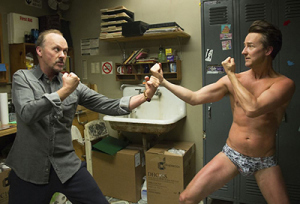
Batman vs the Hulk? No, just two old guys who should get a room.
Sometimes, you have to approach life as if you’re on a stage in front of the world… and you have to use that old “picture the audience in their underwear” trick to keep yourself grounded in front of everyone.�� Because it’s just as important to remind yourself that most of those people out there aren’t living at the extremes, either; they’re in-between, just like you.

February 22, 2015
Khan, failed savior: A better alternate history
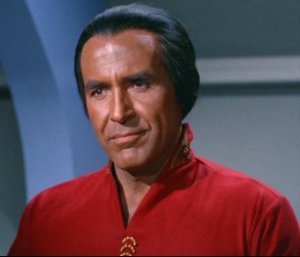 Must be all these hours snow-bound in front of my computer… maybe the sub-zero cold is starting to freeze some (some?) of my brain cells… but it occurred to me the other day that Khan Noonian Singh must have been railroaded.�� (And so were we.)
Must be all these hours snow-bound in front of my computer… maybe the sub-zero cold is starting to freeze some (some?) of my brain cells… but it occurred to me the other day that Khan Noonian Singh must have been railroaded.�� (And so were we.)
Follow:
Star Trek’s Federation history includes, among many other things, the fact that Earth had a World War III, and later, a Eugenics War, the combination of which tore Terran countries and societies apart.�� It was from this series of disasters that Earth’s leaders finally started working together on a platform of mutual trust and cooperation, rebuilding the first truly global society.�� This society eventually came to provide a universal living wage, food and housing for all, worldwide access to medicine, education and opportunities to do what they wanted beyond basic subsistence.
We also know, from the Star Trek Original Series episode “Space Seed,” that Khan and his followers were part of a group of genetically-engineered superior humans who tried, in Khan’s own words, to “give the world order.”�� He and his people were soundly defeated in the Eugenics Wars and forced to flee Earth to escape prosecution.
But I now believe there’s more to the story than that… and a hint as to how Star Trek Into Daftness could have actually become a great movie.
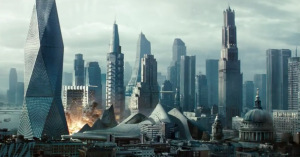 Following World War III, there was indeed an effort made to bring the globe together and share resources evenly and fairly.�� I contend that this effort was spearheaded by Khan and his followers.�� They applied their “superior intellect” to achieving world leadership and negotiating with local governments, unions, organizations and the public, to begin their Universal Resources Initiative.�� The concept behind URI was essentially preventive maintenance: The idea that it would cost society less to provide a basic living staple to all citizens up-front, than it would cost to deal with the costs of poverty, which included crime, health issues, diverted resources and crisis management, later.
Following World War III, there was indeed an effort made to bring the globe together and share resources evenly and fairly.�� I contend that this effort was spearheaded by Khan and his followers.�� They applied their “superior intellect” to achieving world leadership and negotiating with local governments, unions, organizations and the public, to begin their Universal Resources Initiative.�� The concept behind URI was essentially preventive maintenance: The idea that it would cost society less to provide a basic living staple to all citizens up-front, than it would cost to deal with the costs of poverty, which included crime, health issues, diverted resources and crisis management, later.
It was a well-researched and workable plan, and though Khan and his followers knew it would not be initially popular, they set about making it happen, for the good of Earth’s people.�� As they predicted, the world, still smarting from the ravages of WWIII, was not interested in universal sharing, which included those in countries they had just fought with.�� There was resistance to the URI plan of the Eugenics.
The Eugenics might have been able to bring Earth’s people around to their point of view, given time and care.�� Unfortunately, some of the Eugenics, being highly egotistical people, responded in a particularly ham-fisted way to some pockets of resistance.�� This caused a severe backlash against the Eugenics, resistance mounted, and the Eugenics found they could not erase the bad blood spilled by one of their own.
Hostilities escalated, and spread worldwide.�� The Eugenics, dedicated to saving the Earth from itself, finally responded with force.�� But their numbers were simply too few to dominate an entire planet.�� The Eugenics War was bloody and painful, and the Eugenics, certain that they would not be given fair trials once they began to lose power, opted instead to commandeer a freighter, load it with stasis pods, and flee.
History, it is said, is written by the winners���and the winners of the Eugenics War destroyed Khan.�� He and his followers were painted as evil dictators, cruel, heartless and interested in nothing but their own gain.
And ironically, it was the Eugenics’ URI plan that later leaders discovered, and realized it was eminently workable.�� “We can do it, the right way” became the slogan of these new leaders… and the people, much more willing to listen to non-genetically-altered people just like them, and at this point desperate for a way of life that would work, decided that at that point they had no choice but to give it a try.�� It was certainly hard at first, but with more careful and compassionate leaders and more open government, they eventually created paradise on Earth.�� But Khan was vilified for his part in the eventual betterment of Mankind.
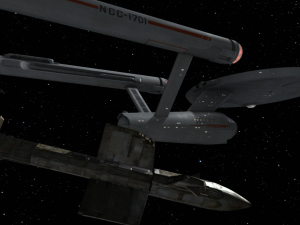 The Enterprise (from the Original Series) encounters Khan and his men and, believing the biased history tapes of the time, accept that they were ruthless dictators.�� Kirk makes it clear to Khan that they are planning to take the ship and crew to the authorities; and Khan, just woken up from (in his perspective) having just escaped a coup and an assured death sentence, would naturally have resisted being handed over.
The Enterprise (from the Original Series) encounters Khan and his men and, believing the biased history tapes of the time, accept that they were ruthless dictators.�� Kirk makes it clear to Khan that they are planning to take the ship and crew to the authorities; and Khan, just woken up from (in his perspective) having just escaped a coup and an assured death sentence, would naturally have resisted being handed over.
I propose that Star Trek Into Daftness should have begun with this premise, which would appear to be identical to the events of “Space Seed” up to Khan’s dinner with the senior staff on the Enterprise.�� But from there, we’d get a very different story.

Hey, he’s been in suspended animation… not dead.
Spock, having considered some of the comments made by Khan, begins a more systematic exploration of old Earth records.�� The history of that era is spotty, but he finds some evidence that Khan and his followers might not be the monsters everyone made them out to be.
But Khan, naturally expecting to be imprisoned with his followers, would find a kindred spirit in the historical expert assigned to him (Lt. Marla “Softie” McGivers), and would convince her to return him to his ship… whereupon he would free his followers, force his way onto the Enterprise and try to take over the ship.
Khan and his people take over Engineering and have hostages, including the Chief Engineer.�� And they demand to be taken to a safe haven, free from persecution by Earth (and not realizing how widespread the Federation is now, so there is basically no place they can hide).�� McCoy wants to just gas the lot of them and have them locked up, but McSoftie wants him���er, wants to preserve him and his font of historical knowledge, yeah, that’s the ticket���and Spock convinces Kirk not to overreact, or they can do serious damage to the ship before they can be contained.
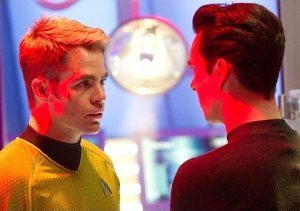 So Kirk goes down to talk to Khan.�� Which naturally, given Abrams’ Kirk, goes tits-up quickly… they get into an argument over control of the Enterprise, which becomes a shouting match, which becomes a fight.�� But as they go mano-a-mano with each other, Khan manages to give Kirk details that reveal the URI was originally the Eugenics’ plan… and that it was the natural distrust of the population, coupled with the bad decisions of some of his lieutenants, that led to the conflicts and the collapse of the plan.
So Kirk goes down to talk to Khan.�� Which naturally, given Abrams’ Kirk, goes tits-up quickly… they get into an argument over control of the Enterprise, which becomes a shouting match, which becomes a fight.�� But as they go mano-a-mano with each other, Khan manages to give Kirk details that reveal the URI was originally the Eugenics’ plan… and that it was the natural distrust of the population, coupled with the bad decisions of some of his lieutenants, that led to the conflicts and the collapse of the plan.
Spock, listening in from the bridge, quickly confirms that Khan is possibly right, and his people were only guilty (initially) of being bad leaders, not nearly the superior intellectuals they thought they were.�� And Khan, reaching a point in the fight at which he could kill Kirk at will, releases him and says he agrees with Spock’s assessment.�� Kirk grudgingly admits that the URI was the greatest thing that ever happened to Earth, and it is at least partially due to Khan that Earth is the paradise it is.�� Khan surrenders to Kirk, admitting his inadequacy to control his followers, and offers himself to the authorities peacefully on condition that his followers are released.
There are factions in the Federation that still consider Khan’s people to be criminals, and so Star Fleet orders Khan and his people to be brought in for trial.�� Kirk, unable to convince Star Fleet otherwise, decides to make a detour.�� He leaves the Eugenics on a planet recently set aside for Vulcan refugees, which will provide a significant addition to the number of people working to rebuild a piece of Vulcan society.�� The Enterprise returns to Earth, but with only Khan, who is willing to answer for his crimes.�� McSoftie, armed with Spock’s reassembled historical tapes, plans to act as Khan’s defense.
What’s that you say… not exciting enough for you?�� Okay, fine, here’s something for you adrenaline junkies:
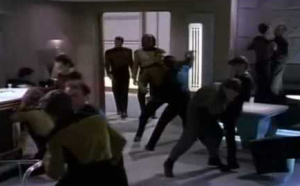 Star Fleet sends a ship (maybe the Reliant, okay?) to pick up Khan’s people and bring them to Earth.�� But when the Reliant team arrives, they turn out to be serious anti-Eugenics assholes (much like security officer “Cupcake”).�� Harsh words on both sides start a battle on-board the Reliant after they beam over, Eugenics against asshole security meatheads, and Kirk and a team beam over to the Reliant to try to stem the battles.�� This time, Kirk and Khan fight together, eventually subduing the Reliant meatheads.�� Kirk returns to Earth with Khan, while the rest of the Eugenics are given the Reliant and fly off to find a home of their own.
Star Fleet sends a ship (maybe the Reliant, okay?) to pick up Khan’s people and bring them to Earth.�� But when the Reliant team arrives, they turn out to be serious anti-Eugenics assholes (much like security officer “Cupcake”).�� Harsh words on both sides start a battle on-board the Reliant after they beam over, Eugenics against asshole security meatheads, and Kirk and a team beam over to the Reliant to try to stem the battles.�� This time, Kirk and Khan fight together, eventually subduing the Reliant meatheads.�� Kirk returns to Earth with Khan, while the rest of the Eugenics are given the Reliant and fly off to find a home of their own.
Epilogue: Back on Earth, security personnel come to bring Khan to the next day of his trial on charges of being a war criminal.�� But he has escaped his cell, Lt. McSoftie is also missing, and amazingly, a warp-capable shuttlecraft is gone.�� How dey do dat?!?�� And Kirk (and the audience) gets to wonder if they’ll ever see Khan and the Eugenics again.
(“Khan and the Eugenics.”�� Sounds like a geek boy band.�� Heh.)
 It’s a shame Abrams never got this idea; it would have made a story GALAXIES better than what we got instead… no people hidden inside torpedoes… no super-starship and evil Admirals… no Enterprise being destroyed (a-frikkin-gain)… no “KHAAAAAAN!” moment… no superblood that suddenly means no one ever has to die in the Star Trek universe…
It’s a shame Abrams never got this idea; it would have made a story GALAXIES better than what we got instead… no people hidden inside torpedoes… no super-starship and evil Admirals… no Enterprise being destroyed (a-frikkin-gain)… no “KHAAAAAAN!” moment… no superblood that suddenly means no one ever has to die in the Star Trek universe…
In short: No moronic crap.�� Just a great alternate history Star Trek movie, with a truly interesting twist that legitimizes an old character and gives Trek a chance to live up to its promise of an optimistic, desirable future.
So, okay, at this point I am going to promise that this is the last time I will write a post about Khan or the Khan episode and movies, because I’ve clearly reached the event horizon of this black hole.�� Which leaves us with just one last thing to do:

February 21, 2015
Love child
February 16, 2015
Orwell’s dead. Get over it.
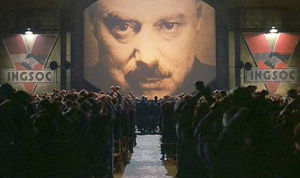 It’s gotten to be a bad joke, recently re-highlighted by the “discovery” that some of the new Samsung Smart TVs had cameras and microphones that could detect the goings-on in front of them (to allow better control of the TV): When people saw the “terms and conditions” warning��that any criminal or terrorist-related visuals or words picked up by the TV could potentially be forwarded to the authorities, the web-verse immediately invoked George Orwell, and decried that “1984 was here.”
It’s gotten to be a bad joke, recently re-highlighted by the “discovery” that some of the new Samsung Smart TVs had cameras and microphones that could detect the goings-on in front of them (to allow better control of the TV): When people saw the “terms and conditions” warning��that any criminal or terrorist-related visuals or words picked up by the TV could potentially be forwarded to the authorities, the web-verse immediately invoked George Orwell, and decried that “1984 was here.”
And as it happened, the spirit of George Orwell reared up out of his grave and said: “Oh, shut up and let me get some sleep already!”
George Orwell has become the modern world’s favorite broken record.�� Anything that even vaguely hints that the government might have some way of watching us, listening to us, or keeping track of our movements, instantly conjures up the tropes familiar to anyone who’s read Orwell’s 1984, and quite a few who haven’t.�� In 1984, the main character, Winston, lives in forced squalor, is actively watched through his television (and addressed by name when his mandatory morning exercises are slacking off), is employed by his government to regularly change historical documents to erase people the government has deemed unpopular or subversive, and when he has an unapproved liaison with a girl, he is arrested and physically and psychologically tortured.�� He is miserable, alone and broken, and he is emblematic of everyone in that society.
And this is the world that people like to reference, on a vehement basis, when the government shows any sign of paying attention to what its citizens do.
Frankly, it’s become annoying and kind of pathetic.�� The Samsung discovery is particularly sad, given that the things people are singling out against their Smart TVs, that they can potentially watch and listen to users in their living rooms, is nothing compared to the ability to track, watch and listen to users of cellphones… and cellphone users take their phones everywhere, not thinking twice about being watched or listened to in their bathrooms, on their toilets, in their beds…
It’s an indication of how hypocritical and short-sighted people are in the first place.�� It goes alongside the idea that their government, in an era of corrupt leaders, uncaring hirelings, limited manpower, buggy technology and ever-thinner budgets, actually have the people and technology available to actively watch and listen to everyone, right now.�� Newsflash: If the government could actually do that, you’d know, because there would not be a single unemployed person in the world���they would all have jobs, watching other people, because you’d need that many employees to keep track of everyone in the nation.
 You’d also think that a public with this mindset would take more notice of television shows like Person of Interest, in which a man has invented a machine that actually can watch and listen to everyone… which he keeps reined in by design to avoid compromising people’s identities unnecessarily.�� Person of Interest regularly and directly addresses the philosophical issues Big Brother enthusiasts love to debate ad nauseam; but when it comes to a show which actually provides some realistic scenarios (for television, anyway) and legitimate answers to some of those questions, the Big Brother fans fade away.
You’d also think that a public with this mindset would take more notice of television shows like Person of Interest, in which a man has invented a machine that actually can watch and listen to everyone… which he keeps reined in by design to avoid compromising people’s identities unnecessarily.�� Person of Interest regularly and directly addresses the philosophical issues Big Brother enthusiasts love to debate ad nauseam; but when it comes to a show which actually provides some realistic scenarios (for television, anyway) and legitimate answers to some of those questions, the Big Brother fans fade away.
And they should���for they really have nothing to show for their paranoia.�� They can claim all they want about their evil governments, but there is absolutely nothing to support their claims, or to even suggest that all of us are being herded, intentionally lied to, intentionally kept down, physically and psychologically tortured, or forced to live miserable lives in service of an authoritarian dictator.�� It’s a convenient fiction to justify the fact that their lives aren’t fully in their control, and ignoring the fact that there are other, perfectly logical and obvious reasons to explain it.�� It’s a crutch, an attempt to use conspiracies as an excuse for personal and societal inadequacies.
Well, speaking on behalf of George Orwell, I’d like to advise all of you to give it a rest.�� We don’t need conspiracies to explain our difficulties in life, some of which are inherent in society, and some of which are inherent in ourselves���because as long as we blame the wrong things for our faults, we can’t properly fix the right things.�� It’s time to stop seeing bogeymen around every corner, and accept reality for what it is: Hard, but real.
Just watch your TV.�� And let George get some sleep.�� He’s deserved it.











